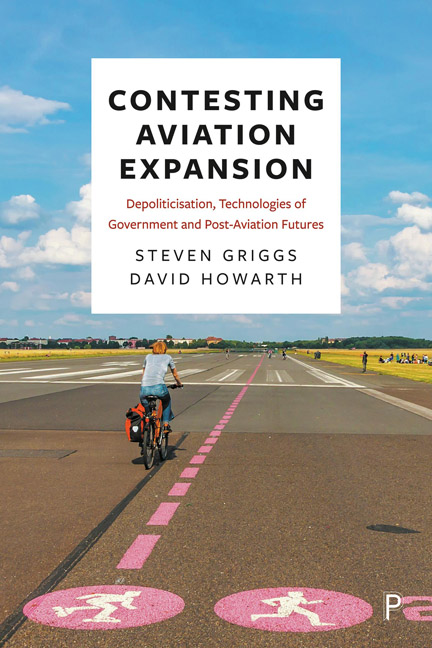 Contesting Aviation Expansion
Contesting Aviation Expansion Published online by Cambridge University Press: 18 January 2024
‘Staying grounded’ captures one of the central concerns of this book: our critique and evaluation of the dominant discourses of airport expansion in the UK and across the globe, where the growth of the aviation industry, despite its accelerating contribution to rising carbon emissions, is universally supported and promoted by most governments and states. Our book has investigated the efforts by the UK state, the aviation industry and public authorities to sponsor the industry over many decades, often in the face of hostile protests and political campaigning, and lodged in this genealogical investigation is a quest to articulate and refine our normative alternatives to ‘binge flying’. But ‘staying grounded’ also alludes to our preferred approach in exploring these issues, as we have sought to analyse our objects of study by assembling detailed genealogies of the ways governments, parties and politicians, public authorities (including local councils), departments of state, the aviation industry, environmental groups, campaigners and citizens have problematised, argued about and fiercely contested where, when and if airport expansion should occur in any conjuncture.
For more than 25 years, we have adopted and developed a ‘slow’ approach in this research, benefitting from a longitudinal study that has gathered and interpreted the ‘common sense’ of actors expressed in this complex policy field (Almond and Connolly, 2020: 69). At times, we have also hovered above the fray at varying altitudes, seeking to show the various connections and differences between the multiple strands of the seven main problematisations of the UK airports issue since 1945, as well as the continuities and discontinuities in its evolution. This perspective has enabled us to deconstruct the dominant myths, narratives and fantasies underpinning the vicissitudes of UK aviation policy, and to propose alternative pathways and futures.
Our book has shown that the case of UK airport politics and policy, especially the future of Heathrow, is what John McDonnell calls an ‘iconic, totemic battleground of climate change’ (Johnson, 2018). It also illuminates a number of pressing issues in the present, including the role of government and their different technologies and techniques in addressing the dilemmas of large infrastructure projects, the paradoxes of depoliticisation, the role of courts and judicial review, the dialectics of protest, campaigning and policymaking, and the future trajectories and possibilities of new ways of travelling, working and enjoying.
To save this book to your Kindle, first ensure [email protected] is added to your Approved Personal Document E-mail List under your Personal Document Settings on the Manage Your Content and Devices page of your Amazon account. Then enter the ‘name’ part of your Kindle email address below. Find out more about saving to your Kindle.
Note you can select to save to either the @free.kindle.com or @kindle.com variations. ‘@free.kindle.com’ emails are free but can only be saved to your device when it is connected to wi-fi. ‘@kindle.com’ emails can be delivered even when you are not connected to wi-fi, but note that service fees apply.
Find out more about the Kindle Personal Document Service.
To save content items to your account, please confirm that you agree to abide by our usage policies. If this is the first time you use this feature, you will be asked to authorise Cambridge Core to connect with your account. Find out more about saving content to Dropbox.
To save content items to your account, please confirm that you agree to abide by our usage policies. If this is the first time you use this feature, you will be asked to authorise Cambridge Core to connect with your account. Find out more about saving content to Google Drive.